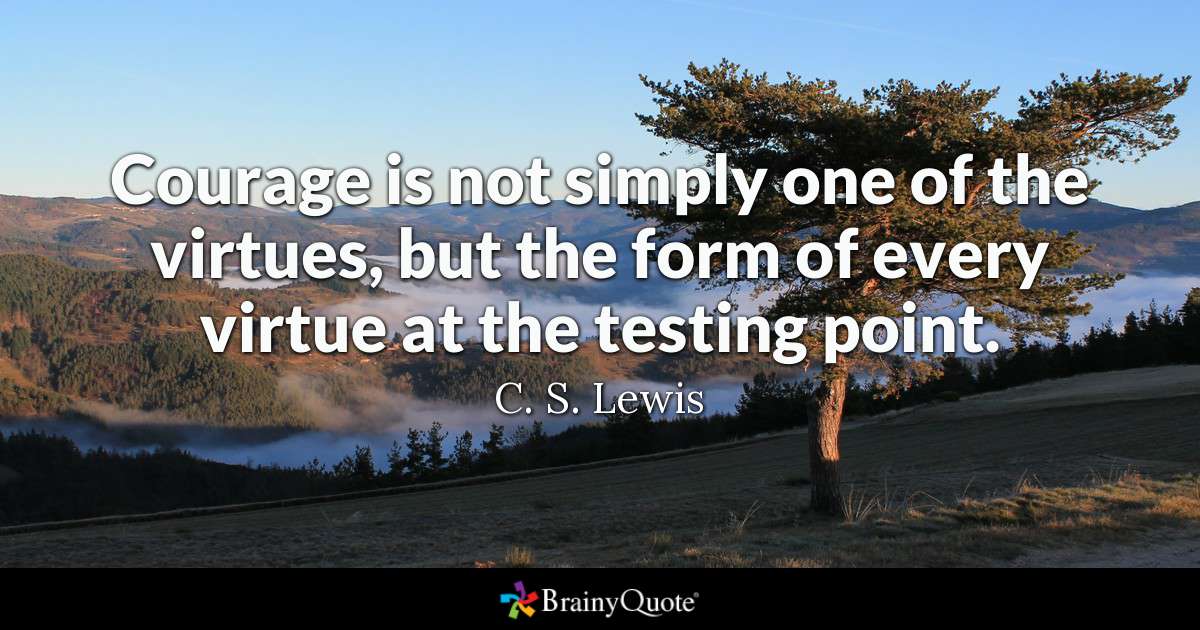Learning takes courage

Learning takes courage. And what our students need from us faculty right now, more than anything, is our courage.
I have a notebook that I use to navigate just about every aspect of my life. Everything goes into it, from daily to-do lists and passing thoughts all the way to deep dives into my darkest issues and greatest hopes. At the front of this journal is a quote from C. S. Lewis that I review every day:

Courage is not simply one of the virtues, but the form of every virtue at the testing point. – C.S. Lewis, The Screwtape Letters
It takes a certain amount of courage to even put stuff into that notebook, because on some level it requires a belief that my thoughts actually matter. (If you have never struggled with the lurking suspicion that your thoughts don't matter, you might not actually be alive.) Acting on those things – or deciding to say "no" to them – takes even more courage because opportunity costs are costly, and every step taken is a thousand not taken. Courage is what all our virtuous intentions look like when it's time to step up or step off.
With the start of a new semester, we college faculty are at exactly this point – step up or step off – when it comes to the profession to which we've been called and for which we have been trained. That profession is both to learn and to lead others in learning ("educate" = "to lead out"). Both require courage. And I want to challenge all college faculty reading this — coming from one classroom instructor, whose classes start tomorrow, to another — to look honestly at the world, and instead of stepping off because of fear, to step up with courage both to learn and to teach.
There's no doubt that the world is not great right now. The pandemic is entering year 2. All of our conceptions about higher education are being upended. There is human suffering on a massive scale. And this is to say nothing about the ongoing social and political malaise here in the USA and the centuries-old injustices that are – finally but painfully – erupting to the surface. On social media, what I have seen are college faculty who look at all this and assess it honestly, and then give in. How can I focus on writing a syllabus in these times? they may ask. Do I even have the right to focus on something as small as that? is a more honest version. It's a fair question.
What I am not saying is that the world is not as bad as it seems. It's actually probably worse than we know. I am never going to enjoin faculty to look past what's happening in the world and suck it up and carry on anyway, because that isn't courage but simple delusion. Failing to see what's actually there is not an act of courage but a form of insanity.
But what I am saying is that despite everything, despite how truly awful the world and the time in which we live can be, we still have a job to do and we have students depending on us.
Having taught 11 credits last semester – 10 hours a week in person under social distancing conditions – I feel confident saying that students need things from us. They need to know that despite everything, we have their learning environment under control. They need to know that we are making every effort to know what we are doing in the classroom and adopting a learning mindset for making it better. They need to see professional learners at work, using their training to make sense of the chaos around them and setting up and maintaining safe places for them to try to make sense of it too. They need to see us living out a commitment as learners, where when faced with the unknown, we do not give in but make a stand and affirm that our thoughts do matter.
In other words, what students need from us right now is our courage.
What's required of us faculty is for us to do our jobs; to be fully present with our students and our work; to stay constant in our love for learning and for those who are learning. We give in to cynicism, comfortable defeatism, and doomscrolling at a cost – and our students are the ones who pay for it. It doesn't matter how virtuous our intentions are if, at this point of testing, our courage fails.
We don't have to have all the answers and we don't have to fix anything. Just step up and do what we're called to do, with clear eyes and a learner's mind.


